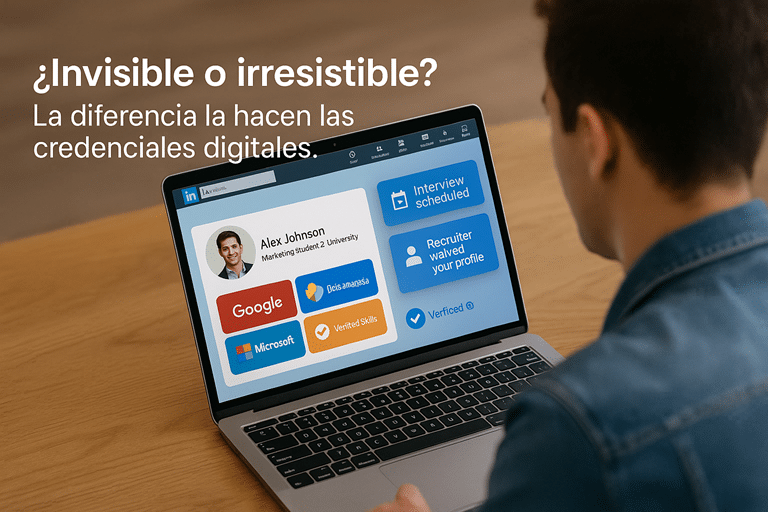The certification of academic skills and achievements has evolved with digitalization. In this context, Blockchain for Micro-credentials It is positioned as a key technology, offering security, transparency and global validity that go beyond a digital signatureBut what are its advantages and what makes it a better option for academic certification?
Blockchain in certification processes
Blockchain technology has revolutionized multiple industries, including education. Its implementation in certification processes allows for the recording of Digital Credentials on a decentralized and immutable network. This means that degrees, certificates, and badges can be verified anytime, anywhere without intermediaries, ensuring their authenticity.
Unlike a digitally signed document, which still relies on a central authority for validation, blockchain distributes information over a secure network, eliminating the risk of alteration or fraud. This allows students and employers to trust the authenticity of each certification issued.
What are the advantages of Blockchain for certifying Micro-credentials?
The use of blockchain in the certification of Micro-credentials It offers multiple benefits that surpass traditional digital signatures:
Immutability and superior security:
Once registered on the blockchain, the Micro-credential cannot be altered or falsified, ensuring complete authenticity.
Student Property:
Unlike traditional certificates, blockchain credentials belong to the student, not the institution, making them easy to use in any context.
Global interoperability:
Thanks to their standardization and decentralization, these credentials can be verified internationally without technological barriers.
Fraud Reduction:
Immediate verification of information minimizes the risk of falsified or manipulated credentials.
Accessibility and ease of use:
Micro-credentials can be shared digitally in seconds, making it easy to include them on employment platforms and professional networks such as LinkedIn.
Digital Signature vs. Blockchain: Beyond Legal Validity
While digital signatures provide legal validity, blockchain technology adds an additional layer of global authenticity. The combination of both technologies creates a complete and robust digital certification ecosystem.
Benefits of Digital Signatures in Digital Credentials
While blockchain provides security and decentralization, digital signatures remain a fundamental component in certifying digital documents. Its benefits include:
- Legal validity: In many countries, digital signatures are legally binding, giving credentials official recognition.
- Issuer authentication: Ensures that the certificate comes from a legitimate institution.
- Protection against tampering: Any modification to the document invalidates the signature, ensuring its integrity.
However, although the digital signature validates the source of the issue, it still depends on a central entity. Therefore, combining this technology with blockchain results in a much more robust and reliable solution.
Digital Signature + Blockchain Technology
To achieve the combined benefits of both technologies, a platform that integrates digital signatures and blockchain is key. While digital signatures provide legal validity, blockchain adds transparency, traceability, and global validity.
This way, educational institutions can issue fully supported certifications, ensuring their acceptance in both academic settings and the international labor market.
Deliver academic certifications with Blockchain
More and more universities and educational centers are implementing blockchain to certify micro-credentials. This trend responds to the need for more flexible and accessible education, where digital credentials can be verified in seconds without relying on third parties.
Furthermore, this model allows institutions to innovate in the way they accredit competencies, facilitating lifelong learning and the employability of their graduates.
Blockchain: The Future of Digital Credentials
Academic certification is evolving, and blockchain is positioning itself as a key technology to ensure security, transparency, and international validity. While digital signatures remain essential, combining them with blockchain increases the reliability and usefulness of certifications. digital credentials.
Ready to implement secure, legal, and authentic Digital Credentials at your educational institution? Write to us at info@acreditta.com and discover how to take the next step in your digital transformation.
Subscribe to blog here and receive all our content







